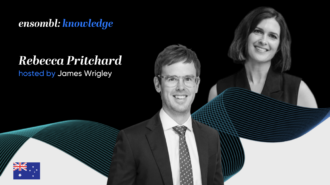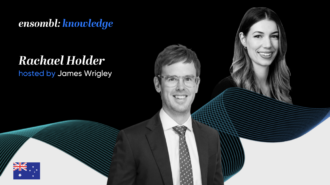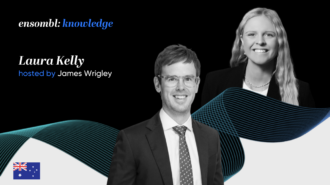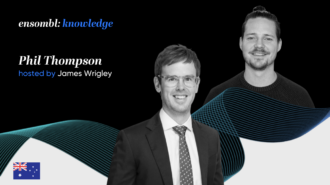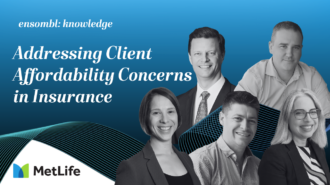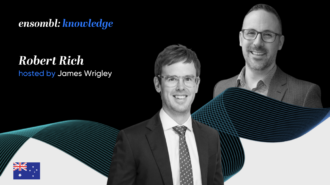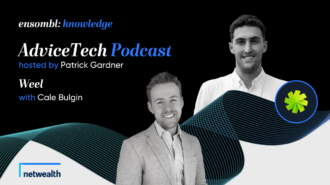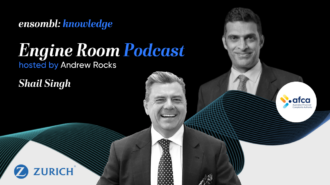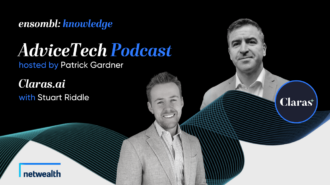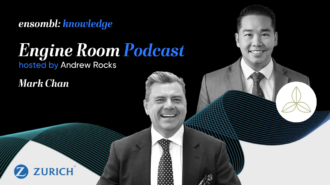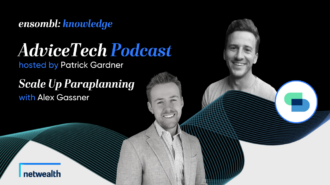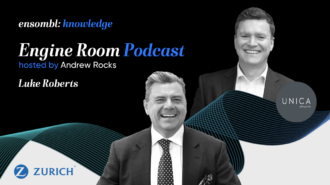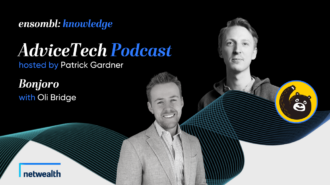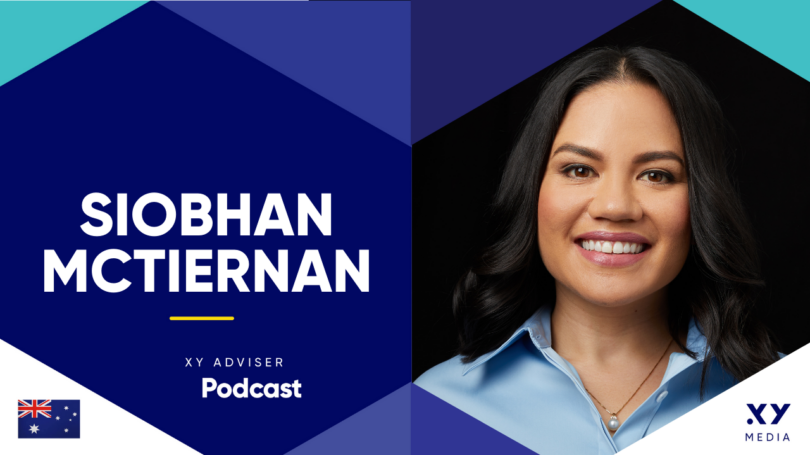
Fraser Jack
Welcome back to the xy advisor Podcast. I’m Fraser Jack and today I’m joined by Siobhan McTiernan and I have forgot that right? He did get there right now that fantastic. I didn’t, I didn’t practice it to be fair. Now you are the relationship manager at pivot wealth with with Ben Nash.
Siobhan McTiernan
Yes, I am still am. So I would say that Ben and me, I think it was like, let’s just take a little bit of a punt, and see what happens. And this is what I need you to do. And it’s working. It’s still working. So just yeah, he’s going really well.
Fraser Jack
Now, what does the relationship manage? I mean, we’ll get into that probably in more detail a bit later. But generally, what does the relationship manager do it people Well,
Siobhan McTiernan
look, build relationships? No, no seriousness, fundamentally, it was the intent of the role was really to remove ban off of that, you know, that initial process with prospects and when clients are inquiring and coming in, and to and really, for, as the business is growing, and we’re in a position where we’re fortunate the business is growing really rapidly, he can focus a little bit more on the business and on other aspects of the business and other opportunities. So the key part, it started off really as a bit of a foundational getting, having those initial conversations with prospects and converting those individuals into old couples into clients. So that was the, I would say, I would describe that as, like the immediate need. And then it slowly started to build out with me creating more opportunities that might be available within the business to build better relationships with our clients. And, you know, I think as many as many of the listeners here would know, advice is a funny thing you get in you’ll do a whole bunch of work, you’ll have your your various check ins, but the other side of the of the coin is the client who wants the fields. And they’ve you know, they’re they have they paid a lot of money to an individual or a business, and how can we create more fields and empower them and give them a little bit more confidence when it comes to their money. So we’re still on a journey as far as that and how that how that looks. But we’re getting there.
Fraser Jack
Yeah, this is a really interesting story, because a lot of the will, and we’ll get into a bit more of this, but a lot of the concept around an advisor is they are spending a lot of time, you know, in that technical, that high technical zone, then they’re spinning, you know, advice delivery zone and, and then they’ve got to spend some time in that, as you mentioned that creating fields. So they’re sort of mixing between those different things. So if if you can, if you can do that, like what we’ve been doing with you, then maybe advice is more scalable. So let’s get into that. But tell us about it. Just go back in time. Tell us about your journey. What What were you doing before you were? Because this is a pretty new thing to you. But what were you doing before you decided to get into financial advice? What was your journey?
Siobhan McTiernan
My background is I started off really in marketing. And I kind of quickly ended up in roles that yes, they were marketing roles, but a key part of them was probably they’ll probably be technically described as acquisition marketing, otherwise known as sales. So there, I was more like the softer sell, you know, getting in there creating awareness, driving people to that point of conversion, and then either someone else kind of injecting themselves into that process or hoping that they would convert as a result of all the work that me my team, the wider team have been doing. So I, I worked at a broad background in education. So I worked at Casio education, which is a really sexy product calculators. So I worked a lot with maths teachers all over Australia. Then I went on to the Australian Catholic University worked for a university in student recruitment, which would fundamentally be the sales arm of their marketing team. And then after that, I just decided that I wanted to just, like, get a little bit more different experience. And I’m and I wanted the opportunity to take on more of a business management type role and running businesses and are working really closely with founders. So I actually caught myself in into a series of working with founder businesses, I took on a role as a producer with a couple of friends that started a creative agency called cello. They’re incredibly successful today. I then went on to work for a digital agency and manage the Australian arm of the business, again, working directly with the founder. They’re called Lighthouse eight. So leading their Australian business looking after leading clients locally here in Australia, we had offices in Singapore and Norway and London as well. And so whilst it seems like really curious for me to end up in a financial services firm, I think for me, it was really natural to work for a founder and working with Ben and I, I really just I think that I found that that’s probably my sweet spot is working with a founder, you know, like working alongside the person who’s probably crazy enough to take all the risk and, and you know, there are a heap of mud at the wall and see what sticks. And I kind of come in and go, I like this. I like what you’ve done here. And I think that I can help Excel. And yeah, I found that that’s probably my personally my sweet spot for now anyway,
Fraser Jack
yeah, that Well, who would have thought that all that history then led towards this specific, you know, this position now, which in a way, it does involve education in a lot of sense, because, you know, I think there’s a lot of time we spent educating our clients working with business clients, and founders and businesses, and, and you found your particular brand of crazy.
Siobhan McTiernan
Right? It’s, like a second tier of crazy, not crazy enough. Still really crazy.
Fraser Jack
Yeah, exactly. Well, I think it’s, you know, it’s fantastic to have you along, and to talk about how you then bring what you’ve had in your in your background into an advice business, obviously, not coming in as an advisor or a practice, or, you know, through those traditional avenues that a lot of people come in as a you know, as a paraplanner, or client services, or all these types of things, you’ve just sort of come in from the sideline going, well, this is pretty cool. I can live in this business and do this stuff. Tell us about what, what it was like coming into a business and not having that traditional background that everybody else walks in with?
Siobhan McTiernan
I yeah, I and I don’t know if we spoke about this earlier. But I’ve actually been a client of Ben’s for around three, three and a half years. So I came into it as a client and understanding the client experience, understanding the impact of advice, what what you know, the joy of advice, really like what, what happens when you do take that leap, decided to get financial advice, go through the planning process, and come out the other side, and I was just a huge advocate of, of the work. And in particular, I like the way that pivot wealth, position the business, I really liked the the no agenda aspect, I do you think that advice. You know, obviously, a few years ago, it was obviously, there’s been a lot of interesting firms out there, and I’ve got friends that have worked for those firms. So I loved what pivot wealth had, you know, pivot wealth had to offer and I was a huge advocate for it. So coming into it, not having the advice side of the business and talking to prospects, it was almost, it was natural, and I probably found it really easy. And it probably helps in some respects, like, I know, a really big challenge. And Ben will say this and randomly ended up in my my mother’s group, there’s another financial advisor, and she was asking me about it, she’s like, it’s really hard to have meetings with clients and almost like, not give away the, you know, the keys to the kingdom, and I can’t give her physically cannot be I cannot, I don’t have that knowledge, to give away the keys to any kingdom, I probably, you know, you might end up in a shack house, if you follow my advice. So it was it was, I could easily feed into how this process is going to make you feel where this will, you know, we don’t know where you’ll end up. But I what I can say is, you’ll be feeling a little bit more confident, a little bit more sure of where you are, then then the position that you’re in now, and take it from me, because I’ve been there. And I’ve done that
Fraser Jack
this is a really good way for you to say to somebody, I’ve been there, I’ve done that I really liked the way he said the impact and the joy of advice we get so carried away with the value of advice in those terms. But I think understanding it is that I went through this, this is the this is the way I felt about it, this is the way you can feel about it. Well, before you having any conversation around what the actual advice or the value of advice is gonna be.
Siobhan McTiernan
I completely there’s the there’s, I always say this to the beginning, anyone I speak to I was like, undoubtedly, there’s the financial benefits. Can I quantify that for you? No, then there’s undoubtedly the non financial benefits. And I think you’ll get out the other side, and it’s a journey. And you will, you’ll love the financial benefits, no doubt without a shadow of a doubt. But what you’re really come to appreciate, in my opinion, is the non financial benefits out the other side, which suddenly has you you know, as you know, the average individual the average couple who’s who, you just don’t want to have to think about it and know that everything’s kind of taking taken under control. It’s a kid like I think he could you can kind of look at any you could speak to any therapist, you could speak to anyone, you know, finances like can be a source of stress, if you can, you can at the very least eliminate that in your life. And if that does involve going down the planning process, it’s probably I think that’s, that’s the lens that I come at it from is the just do this and just like you don’t have to worry because right now and that’s the that’s the key thing, right is when people come in and they speak to you they’ve got a whole list of What they want to achieve, and at the end of the day, their frustration is probably not being able to achieve that or not knowing how to get there or not knowing if they can get there. What is that that’s, you know, ultimately financial stress to some degree, you might not think people often think of financial stresses, like, I have no money, but it’s just the fact that you have to think about or it’s keeping you up at night. And that, you know, it can come from like having no money, it can come from having a lot, not knowing what to do and not, you know, not, not not knowing if you’re maximizing the potential that’s available to you. So, yeah, it’s interesting, I would say that my conversations with people are more, how’s this going to make you feel? And what that outcome? What’s that ultimately going to mean? For you? What’s it going to mean for your family? What’s it going to mean for your future outcomes? Have a think about that. And, you know, maybe we could highly at a high level speak about the financials, but I don’t know that that really matters.
Fraser Jack
Yeah, it’s interesting that you can separate that at the very early on process and say, Look, you know, stress, anxiety, frustration, these are all emotions that people come in with, and I see them, see those emotions change to confidence, and all these types of things. And, and then worry about the financials in in, I guess that’s the financial, that’s the advisors job to worry about the financial side of it. And you’re just there to focus to make sure that they are noticing that they were feeling one way at the beginning, and then noticing, consciously noticing that they were feeling a different way after the process. That’s
Siobhan McTiernan
absolutely, we now do check ins like I come back in and I check in with every client after they’ve gone through the implementation process. And again, I’m not really I don’t know, their SLA, of course, they’ve communicated with me at the beginning, what they were hoping to get out of the, of the planning process, I don’t really check, I don’t really want to, I don’t really want to know, their personal financial details. I just want to get in, I want to get in over the other side. Let’s have a chat about the process. How’s that landed for you? How’s that making you feel? And then how can we maximize this relationship at the end of the day, you’ve committed to working with us, so I want to make sure that you know, that you can lean on us, if you think things are gonna change or if you think that if you think things are, are going to change, this is have these discussions with us, let us again, it comes back to that. It being a stressor, like reduce that reduce that element of stress out of your life and utilize us and maximize and maximize the relationship that you have with us. And we always were flexible, we always want to help
Fraser Jack
course, and I think I think wanting to help is the is one of the causes of every financial advisor. I know they want to help. That’s what that’s what got them into into this. What do you think that saves, say, a ban or an Advisor that works in office in time for you to do that all that pre emotional support work? And then that work after as well? What sort of time factors is that same out of their life?
Siobhan McTiernan
Oh, my gosh, if I have to think about the year that it’s that’s been Oh, it’s, like, I what I can say is Ben or, you know, even if an advisor was doing this, you physically, it’s like, two and a half, like I know, for a fact, some of the some of the months that we’ve had you taking the workload of like a 1.5. Like person workload, like the sheer volume of conversations and meetings and discussions and, and, you know, you have those conversations with people where it’s pretty cut dry, it’s like, you know, yes, no, the, you know, practicalities, but broadly speaking, it’s, it’s a bit of it more of an emotional, and there’s something else that’s under there. And if I had to, like as in, what I can say, is Ben physically would not have been able to have done, done that done the job, like is in just the time, the sheer volume of time. So it’s, it’s freed up and, you know, freed up a whole person of times plus job. And he said,
Fraser Jack
and I’m also thinking that, you know, if an advisor is really busy, then this could be the, this could be the part of the process that because it’s a non compliant part, or is there’s no rigid, like, it’s, it’s, it’s the part that makes the client feel amazing, but it’s the part that is there’s nobody sitting over the top like a compliance officer saying you have to make sure you do this. So it’s probably the part that gets dropped first, when an advisor hits capacity,
Siobhan McTiernan
which is a key thing that we you know, we discuss, and it’s keeping that I say to, I have to I have to admit this it’s a super, super rare situation where the client wants or the prospect rather wants to speak to an advisor. It’s very rare. But my if they do ask, it’s because I don’t know that they need to be involved in this conversation. I would rather that if you came on board as a client, they have all the capacity in the world to strategize and deliver really good outcomes for you. them taking time out of their day to have this have this discussion or focus on business development isn’t going to help any of our clients and our existing clients and it’s not going to help you you as a client, because you know that your time’s being sucked out with them, you know, kind of talking about cadences and timings and what’s going to happen next.
Fraser Jack
Okay, well, and so when you mentioned business development, do you see yourself as a business development manager in the inside?
Siobhan McTiernan
Yeah, absolutely. So yeah, without a doubt, there’s definitely, it’s certainly, you know, started off that way. I think it’s slowly expanding into lots of different arms. And, and I suppose, again, that comes back to my experience, and what I’ve done as far as like working with founders, and leading businesses, where Ben can pull me into larger projects, as well. But But yeah, there’s there’s undoubtedly, that that business development, and then a key, you know, there’s that key aspect of, of me, figuring out how we can, you know, they fundamentally be becoming a business development role. And then as a business, we can scale because we can put someone else in this assembly, there’s a process, it’s just, you know, finding the right person to be able to take that, that on, and then we can continue to grow.
Fraser Jack
Yeah, but you know, I only say it like that, not as a not as a bad thing or a good thing. It’s just that it’s relatable. And now, obviously, within our profession, because we know what VMs are inside their profession, and we can understand the concept of art, this actually works for these product providers, Why could it not work for financial advice business, just because nobody else has really done it before? Doesn’t mean it can’t work? Yeah, absolutely. that tell us about what that means. So if I’m a new client coming in to pivot, what does it mean for me like, Dude, you’re my first point of contact? How does it work?
Siobhan McTiernan
Yeah. So I would actually say, and we talked about this a lot, as far as like, you know, when you think about attribution, to, you know, to get to that conversion point to a client, Ben and our team do a lot of work at the front end, creating a lot of resources and content, and we, you know, ensure we just put the information out there so people can educate themselves. So we find that they generally following us for a little while, and then then they’ll have, you know, be presented with multiple opportunities to
Fraser Jack
get started, before we get to the booking part. Tell us a little bit more about that content. Because I know there’s podcast and there’s, there’s, you know, there’s downloadable books, Ben’s book, etc. Tell us about what that that content structure is. And obviously, there’s been in the media as well as in there’s bits and pieces, there’s videos all over your website. Tell us a little bit more about that.
Siobhan McTiernan
That’s an excellent question. There’s so much that happens that I’m going to be honest that even I can keep up at the best of times. But like, right down to last week, Ben’s like,
what are you doing? Can you come down meet me down at the studio? So I’m on the TV. But so it’s good in the you know, there’s obviously a lot of good stuff that’s, that’s happening at our end. But
key drivers for us would certainly would undoubtedly be. We do various webinars with their broadly promoted, we have a relationship with General Assembly, we also partner with a bunch of other businesses such as self wealth and raise as well, to deliver content to, you know, the public and also their followers. We also do, now you’ve put me on the spot, I’m going to have to think about all the things yes, we do a lot of media, then has his book. And then as a result, a lot of people end up on our mailing list. So we have a regular newsletter that goes out just weekly, into their inboxes, that that content is really what’s happening in the world weekly wrap up of the markets and and then we do we have the podcast, of course, and, you know, client interviews that we’ll share are just some general interest, things that we’ll share on there as well. And then we also write for news as well. So we get a lot of press that way. So people will stumble across us. And then we you know, there we have social media efforts. And, and, you know, we do some work as well with SEO. So when people are searching for financial advisors, we’re fortunate enough to pop up. So we find that and I can almost attest to this to being even a part of my journey that we’ve got that also heavy word of mouth of referral through our existing client base as well. And I found out about Ben through, through and through a friend as well. That’s how people, broadly speaking will stumble across this in the first instance. And then we’ll find again, broadly speaking, and you we have these conversations by the time I have chatted to them, they’ll be like, I’ve been looking at your website for about a year I’ve turned up to a few events. I’ve listened to your podcast, I’ve seen that you got to walk and and now I’m in a position where I think that you know, I thought I should make a call. And so when they met when they broke in and have a call with us, they will have a chat with myself. And then on that call. I just want to hear a little bit more about them and understand if first like primarily as well understand if there’s a fit there. Where are we really, you know, open and honest if we’re not gonna force anyone down the path of financial advice, if there’s not a fit there. So I want to understand a little bit more about what are they trying to, like what’s happening often is a catalyst for the conversation. What is a really good outcome? Like? What is what is success? What are you trying to achieve? And because as every good advisor would know, they, you know, they want the, they would love the client to have goals, clear goals, ideally, specific goals. But I know that not many clients have very specific goals very, very few do anyway, when they walk in. Exactly right. And then, and then I’ll just understand if there’s any challenges at their end that they’re struggling to overcome? And then I’ll walk them through what next steps would would look like. And that next steps would be another session with myself, we would then do that over zoom. And we’ll have an extension of that conversation, like what is a good outcome look like? What’s stopping you from getting there? We walk through our philosophies and principles. So these are the things that we hold up to all of our clients and say, This is how we work. This is how any good advisor would work. So this shouldn’t be you know, this isn’t, whilst this information is the way in which it’s presented as exclusive to pivot wealth. The overall message isn’t that the philosophies and principles shouldn’t be exclusive to pivot wealth. And then I’ll just walk them through the practicalities of the advice process timings cadences, what happens next, that call? Yeah, we that usually takes off, to be honest, it usually takes about an hour, if it’s if it’s concise, it’ll be 45 minutes. And we do charge for that session. We will charge normally around $195 for that session. But that is a full donation that goes to a charity we support called V one G one. So that charity is called business for good. And they essentially, I’m trying to think of the best way to describe the one G one but it lets you essentially embed giving into your business activities. So you can create impact through the work that you do within your business. So providing clean water across countries in Asia, and we also fund a project in Malawi, where, essentially they’re giving business advice, financial business advice to women in Malawi, as well. So there’s variety projects that we would look after, where those funds would go to.
Fraser Jack
And the concept there is that businesses look at donating 1% of their income as a charitable gift to the to the charity. Exactly. Right.
Siobhan McTiernan
So that’s an internal goal that we have. We don’t I mean, I appreciate I’m talking about it now. But it’s not something that we’ve like overly, overly talk about. We just found it’s a really good way for us to help meet those targets, when when clients come on board as well. I’ll talk about it if clients ask a little bit more. And, yeah, we’ll also make a donation if clients you know, celebrate their big wins. So buy houses have babies, things like that. Yep,
Fraser Jack
exactly. Now that that also promotes in the clients head, that you charge fees for your time. And, you know, if they don’t want to pay that 195. And they also know it’s going to charity, but it gives it gives it starts that relationship off on a charging or fee basis.
Siobhan McTiernan
Absolutely. And it’s also I’ve got to be honest, I I think, you know, when Ben shared with me, that was the process I think even in like a traditional sales concept that I think I like I suppose agencies do this as well like, charge for you to you know, charge for the pitch because you aren’t using other resources and time and you might not, you know, when the workout the other side, even though they are profiting from that though. So it’s a slightly different model. But yeah, we found that it the type of clients where it creates a positive sentiment at their end. And the top clients we want to work with at the end of the day, this is it’s a personal business, I think sometimes clients will come in and like they’re the boss of you now. And I’m like, no, no, no, that’s not how we work. This is a partnership. And, you know, we want to create a little bit of an even even playing field. So we do find that the sentiment and it’s, I can honestly say I think I’ve had two people and I’ve spoken to hundreds of people that have that have, you know, had a bit of a negative sentiment about about that and like, that’s fine. I’m not sure that whether we’re perfect for you. So
Fraser Jack
best of luck. And was this was this the process when you came through the client?
Siobhan McTiernan
No, I met with Ben quite early on. I would say that this process not like even this whole process isn’t really the actual planning process has always been the same. Ben’s been you know, I’ve been pretty solid with that. But no, this was a a COVID thing last year Ben started this so I’ve just you know, we’ve just kept it going this year. So no, it wasn’t not when I Back when it was just spinning and Yang, when I joined, I didn’t know who was behind the scenes.
Fraser Jack
So, so So you’ve had, you’ve had a quick call them, you’ve jumped on a zoom for an hour, what’s the next step after
Siobhan McTiernan
that make decision? From their really, I hope that I’ve given you enough information. Sometimes they’ll say yes, on the spot, sometimes, you know, often they’ll of course want to take some time think about it. I always offer another call afterwards. And sometimes Ben and I will jump on a call with them afterwards. But I really upfront and Frank in the fact that no one like if you’re trying to be trying to understand what the outcome is going to be, it would be absolutely reckless that for us to kind of, you know, broadly tell you what, what we think you’ll you’ll get out of this financial the financial outcome. Yeah, exactly. Sorry. Yes. Yeah, to be clear, the financial outcome felt like off. Yeah, if I spend X, am I gonna get why it would be it would be grossly irresponsible for me to, you know, give you an idea as to what that’s going to be? Because I don’t know, again, I can tie it all back into the conversation that I’ve just had. We don’t You don’t know what a good outcome looks like for you. We’ve just had this discussion, you’ve explicitly said to me that there’s a variety of different, you know, things that you’re looking to do, and you’re not sure which one’s the best way. So it would be reckless for me to go, I think, you know, maybe that way would be the best way. And it’s gonna mean x like, yeah, and they get that which is, which is good.
Fraser Jack
Yeah, forecast forecasting to the interesting thing, isn’t it? When it comes to, you know, we, nobody knows what the future holds. I remember listening to I went to a conference once and then the guy stood up and said, You don’t know what a good financial plan is. The client doesn’t know what a good financial plan is, the market determines what was a good financial plan after the fact. But you know, when it comes to the numbers, nobody actually knows what it’s gonna be. Exactly right. Yeah, so I was gonna say, so that, then the decision really is around, do you want to go from you know, you know, emotionally unknowing, anxious, all these types of things that we’ve just covered to a place of this? Isn’t this because we know that’s what happens with all of our other clients? And so that’s the decision they make, I guess, for the fees you charge?
Siobhan McTiernan
Exactly. Right. That’s almost the conversation that, you know, would happen, where it’s like, you’ve, you’ve said that you wanted to feel this way, be confident about this, know that you’re in this position, that the balls in your court, we will we can give you clarity on that? And if all of that, you know, feasible and what that outcome would look like, the balls in your court?
Fraser Jack
Yeah. And I noticed one of the things on your website is something like the average Australian says 4.7% of their income, our clients save 35.2. So those are the types of things that you’re able to say, I guess that’s a more of a marketing,
Siobhan McTiernan
like some of the specifics are where where, you know, we can we can absolutely say that we have actually had a conversation with, again, a client who’s just finished her plan, or her and her husband finished their plan implemented. And she was like, Oh, my gosh, we’ve saved so much money since we last spoke. We’ve accelerated our plans, we’ve gone and done this. And I’m like, It’s not that our work here is done. But like, you know, the foundational work take like that’s at the very least like that. Some. Yeah. Which is amazing. Like, that’s, those are the stories that we obviously love to hear. But were really big on the foundational aspect as well of which I think is I’m not sure. Do you know what I actually have no idea. I’m not sure if this is overlooked by other by other advice firms, but we’re, we’re huge on your banking and saving structure, not having to think about it creating a lifestyle baseline, because we are fortunate enough to work with, broadly speaking a younger client base. We’re like, Yeah, cool. Well, let’s like, let’s maintain like, you want to keep your holidays in there. And I probably want to keep your dinners out. That’s all good. We’re not We’re not here to talk about major sacrificing, maybe, maybe we are but broadly speaking, we’re not trying to like put you on a budget. What I want to understand is what’s your lifestyle baseline? Let’s map that out. How can we how can we create some rigid savings around that way you’re not thinking about it? And then let’s the the key thing here is coming up with a strategy and that’s that saving surplus is key to continually driving the strategy and continually driving as you would know, driving those outcomes.
Fraser Jack
I love I love the words you use lifestyle baseline. I like things like spending plans rather than savings. You know, the whole idea of understanding what you focus on the spending part just spend that amount
Siobhan McTiernan
totally budgeting I think that’s what some people think they’re going to get in and they’re gonna be like I can’t go to America this year like no get still go go to the US have your holiday. Let’s just plan around that.
Fraser Jack
Yeah, perfect. Now, obviously the the make a decision, the call to action, the decision making and then what happens if somebody decides then has to make a decision? I guess the decision should be yes or no, not just no decision.
Siobhan McTiernan
Yeah. So they’ll make a clear decision if they are going to move forward. And then I do a really quick intro zoom call the key with with their advisor and, and the advisors associate as well. And the intent of that call. And I’m really upfront and saying, Our process is really hands on high touch, you’re going to be spending a lot of time either in a room or over zoom with these individuals. It’s just important that you meet and, you know, let’s just start building rapport. And then of course, we’ll get all of the admin out of the way, let’s get the form of meetings in, let’s get you across the admin, give you some deadlines. And be confident that once you’ve done the little bit of homework that we need you to do, you don’t have to think too much after that. Just turn up to the meetings and give us the yes, no, maybe wise and we can start delivering for you.
Fraser Jack
So with those meetings do you do you don’t don’t book in one the next meeting you booking in the hub? several meetings?
Siobhan McTiernan
Yeah. So how many?
Fraser Jack
How many? Approximately? How many meetings is that
Siobhan McTiernan
three meetings we have? The best way I would describe them would be the first meeting would just be there. What we call the clarify meeting, it’s like a workshop. Let’s get together. Let’s brainstorm what is a good outcome. You’ve got some ideas we’ve we know, we know everything that’s going on at your end. So let’s share those with share our ideas with you. Then the meeting Following that is the findings of the workshop. So this is what we chatted about. And we’ve laid it out into, let’s say four options. Here’s option 1234. And it’s, you know, the numbers around what those workshop plans. Sorry, the numbers are clear, then on those workshops, plans. And, okay, I love option two, but there’s an element of option three, that I think we could really push ourselves, let’s workshop that, right, let’s go through the details. And then by the time they get to the end of that meeting, then there then that, you know, they’ve got a pretty rough idea as to what their plans, they’ve got a pretty sorry, they’ve got a pretty clear idea as to what their plan is going to be. And then after that, let’s put it all together, we won’t go away, put it all together in an SOA and present that to them.
Fraser Jack
Wonderful. I love the way you call them. Workshops, not just meetings.
Siobhan McTiernan
They kind of Yeah, because they really hands on, they’re really, you know, let’s all let’s just let’s have a workshop, let’s like talk about what, and that kind of language I think is a little bit more relatable to certainly our clients. But you know, when you’re largely speaking, talking to, you know, a bunch of professionals, everyone’s been forced into a workshop at some point or another. Some type of design thinking something something.
Fraser Jack
It also puts everybody in the same seat, I guess, like everybody’s got work to do. It’s not just about I’m here to listen and sit and do nothing.
Siobhan McTiernan
Yeah, no, exactly right. We want you to kind of to come to the table with your ideas, let’s workshop those we want to, you’ve got and you know, more often than not, they’ve got some pretty clear ideas. They’ve got some some goals around what they want to do. So let’s, let’s talk about that. But what where, where that process really is removing them a little bit away from this the tactical, like, right, buying a property investing, blah, blah, blah. What we’re trying to workshop with them as well in that session is be is to move beyond the tactics. And let’s focus in on the goals. What does it what does, what does that long term? What does that look like for you guys? Let’s understand what maintaining that lifestyle baseline looks like for you, for you, or for both of you, all of you. But the key thing that we’re trying to drive out of that is the bigger picture. Yeah, the tactics of the tactics, right.
Fraser Jack
Yeah, exactly. All right, fantastic. So we’ve got, we’ve got the decision making, we’ve got the zoom, quick zoom call with you, essentially, getting the yes or no. And then the quick introduction and booking into the three more meetings. We kind of know what discovery meeting strategy meetings and advice meetings are. So we’ll we’ll skip over that. But then tell us what happens after that. Obviously things one place, and you mentioned that you’re you’re then you jump into to their relationship. And again, talk us through that.
Siobhan McTiernan
Yeah, we wait until they’ve completely executed and implemented on their initial plan. And all clients that sign up with us now are working with us in a long term, at the very least to 12 months relationship. And then I will once they’ve implemented their plan, I’ll catch up with them out the other side, and make sure that they know how to we just don’t want them to be in a position where they’re coming to us after the fact or not flagging stuff with this earlier or not taking action and you do have those conversations with people. They’re like I transferred, you know my money Hear and I don’t really know what happens next. That’s okay, let’s action that for you. And then also having a discussion with them about how they can maximize their relationship. And of course, getting some feedback on the process and how they’re finding, working with us. as well. I think that that’s, that’s important for any business, any, anyone in business, right is to just get that feedback. I want to hear, I want to hear everything.
Fraser Jack
Yeah. When you say maximizing the relationship, what sort of things you talk about, just like for them to be dipping into their podcasts or getting the reading the newsletter, or touching base when this happens? Or what’s the, what’s the idea, celebrating the wins, or you know, all those sorts of things, fix
Siobhan McTiernan
things like, and I can, I can talk to this firsthand. Once you once we’ve like, let’s say set up a brand new banking and saving structure, there’s a bit of teething that happens at their end. And, you know, it’s it’s lean on us. And let us just get in there. And we can have a quick discussion. It doesn’t necessarily have to be the advisor, it could be someone in our operations team, it could be someone, it could be an associate, and let’s just have a conversation and quickly run you through it again. And, you know, I had a conversation with someone the other week, it was like, I’m overspending, like, I know I’ve put that I was like, That’s okay, like, well, you’ve got to be teething with this, let’s arrange a call with one of the associates will show you where to update it. And we’ll show you how to quickly make those changes. We don’t want this to we don’t want you to feel like you’re stretching yourself. That’s that’s the complete opposite of what the intent of the situation, or the intent of the planning process was. So it’s it’s allowing them to lean on us to know that the initial planning process isn’t over, leaned back on us for everything from teething issues to your banking savings to if things are going to change, or if you have we were planning for kids, and we suddenly were pregnant. Let’s have that chat. Okay, that’s cool. Let’s have a session about that. And let’s figure out what what next steps would look like. So they know that they essentially said that, that they are confident that we’re a trusted resource in their corner. And we want to be having conversations before the fact not after the fact as well. And not and making making sure that they feel empowered and confident to reach out to us. And yeah, they know that that we’re there and we’re on their side. Yeah.
Fraser Jack
So when life does change, which it will, there’s there’s certainly somebody that they can that they’ve had a good relationship with, that they can easily pick up the phone or jump up because yeah, exactly right. anticipated. So obviously, this then is a fantastic time for you to ask for referrals or talk about how other people like you can work with, is that part of your process?
Siobhan McTiernan
Exactly. Right. Yes. That was a key one. I forgot about that. Yes, we I will just say if you if there’s anyone else that you’ve that you thought would benefit from this process, then I’m happy to offer and I’ll offer up either a couple of free breakthrough session those those zoom calls, a couple of those for free, or at the very least at a discount, like half the price, which keep in mind that obviously is still still a donation to charity. So yeah, I’ll offer that at a discounted rate, if they know anyone that would be would take advantage of that would say the benefits of working with pivot wealth. Yeah.
Fraser Jack
And not everybody wants to just introduce their friends. And but obviously after they’ve been through a good experience, that’s that’s a pretty benefit. Good time to have that conversation. What would you say? The amount of people that then think about, Oh, what about such and such we could introduce like they’ve been just as you’re a super referral a newer client? Do you find that a lot of people dive on to that opportunity?
Siobhan McTiernan
I think you got those people who, who just naturally, I don’t know if you’ve ever read. I actually can’t remember exactly which book it is, but it’s a Malcolm Gladwell book. They’re like people that they you know, you’ve got your connectors and you’ve got your mavens. Yeah. Yeah, I think it’s just if you happen to go through and I would probably I would describe myself as a connector, you happen to bring someone who’s a connector through the process. I think that they’re individuals who are most likely to just be a bit more proactive. And, you know, we’ve got someone at the moment I think it’s just completely trumping me as far as being a super referrer. She’s gone through the process with her and her partner, and she’s just bred us like wildfire. To her network, I don’t know if she’s, yeah, blasted some some email out to everyone, but we’ve had a lot of people come through from through just one person. So I think that there’s naturally those people who who are connectors who would, who would do that. And then outside of that, yeah, then it’s then it’s more of I think, if like, you know, you hit an age where you’re at a party and suddenly find out finances form part of the discussion, then, you know, if we’ve got clients that are there, then they’ll they’ll share our details.
Fraser Jack
Yep. Fantastic. And there’s easy options. And as I mentioned, because of the content production, you can just check out the content. It’s an easier, it’s an easier referral. Exactly right. Yeah. So yeah, there’s there’s personalities, then there’s great results they can they can be both referrals. So in I think, I think by the sound of it, you found your next BDM, too, by the way to say she’s coming in as the next relationship isn’t exactly. I mentioned before that that’s the benefit of putting the processes in place as it becomes scalable, so wonderful. What about what about Google reviews? And those sorts of do those?
Siobhan McTiernan
Yeah, we do do? Yes, we do. And I think we could be a little bit better at it. And I think that B probably not being as good at it is just flat out a result of being incredibly busy. It’s it’s, it’s offense, probably gonna listen to this at some point, it’s on the list. Honestly, it’s on the list
Fraser Jack
just just just so being listens to all these episodes. Sure. Panicking that’s, that’s in there. So what are the plans? You mentioned before? You know, putting things on the list? What are the sort of things that you plan on, on working on obviously, you know, everything’s a work in progress. And one of the things that on the short and long term list
Siobhan McTiernan
we’ve had, I’m not sure if you’ve stumbled across it, we’re in the AFR. But we won the contract to take care of the advice for the NRL players and a relationship that we structured, struck with the RPA. So we went through a, it was a tender process, I think there was around 20, there was a lot there was like maybe at least 18 firms that went through. So we were we were successful in winning that contract. So a large part of that is, you know, my role is, you know, all of our other channels for business development. So certainly building better relationships with with the NRL clubs and working closely with them. And again, it’s in the same way in which we deliver our content like Yarrow pay is taking care of it, it’s just making sure that the players are aware that we’re a resource, they’re fortunate enough to have, you know, to be well resourced through their various clubs and through the LPA. Know, that were a resource to tap into. So there’ll be a little bit of work in the new year, as far as building those relationships, to drive more players to just have discussions with us and make sure that they’re on the front foot. They you know, a lot of a lot of those play, a lot of these players are obviously are in really fortunate situations. Not all of them are, so it’s maximizing what’s available to them, as well. So that’s, that’s a lot of work that we’ll have coming up in the New Year as well.
Fraser Jack
Yes. Is that just one on one? Are you gonna be doing like webinars and seminars and the time?
Siobhan McTiernan
Exactly right. So a bit of both talking to the teams. And it’s obviously been a while it hasn’t been that tricky. It’s, you know, those types of things. When it comes to any relationship. I think sometimes people do lean on the be nice to just meet face to face. COVID obviously been a bit of a killer when it comes to that. But so they’ve been still really responsive with doing a lot of stuff online with us. But it’ll be good. It will be I think, I, you know, I personally think it will be good once we can start meeting people face to face and certainly building rapport. But no, yes, certainly about, yeah, one broad content that they can that they’re interested in. And then and then one on ones as well.
Fraser Jack
Yeah. Well, fantastic. Thank you so much, Shivani, for coming on, and telling us about your BDM style process in which is very different in a lot of fight for how a lot of financial advisors do it. But obviously, it’s working very well for you. You’re busier than ever and got a lot on. If somebody wanted to continue this conversation with you, what would be the best way for them to maybe try and reach out and make contact?
Siobhan McTiernan
Absolutely. They can reach out to me via LinkedIn. And also just jump onto our website and just send her an inquiry at the bottom of the page there and I will get that.
Fraser Jack
Yes. Jump on the websites in the query enough in the sales funnel understand to get the newsletter. Siobhan is about the traditional Irish way. Yes, that’s right. Yeah, its S I O B H A N.
Siobhan McTiernan
Yeah, that’s right. And we look forward to I have people reach out in contact.
Fraser Jack
But thank you so much for coming on and sharing your journey today.
Siobhan McTiernan
No worries. Thank you for having me.
